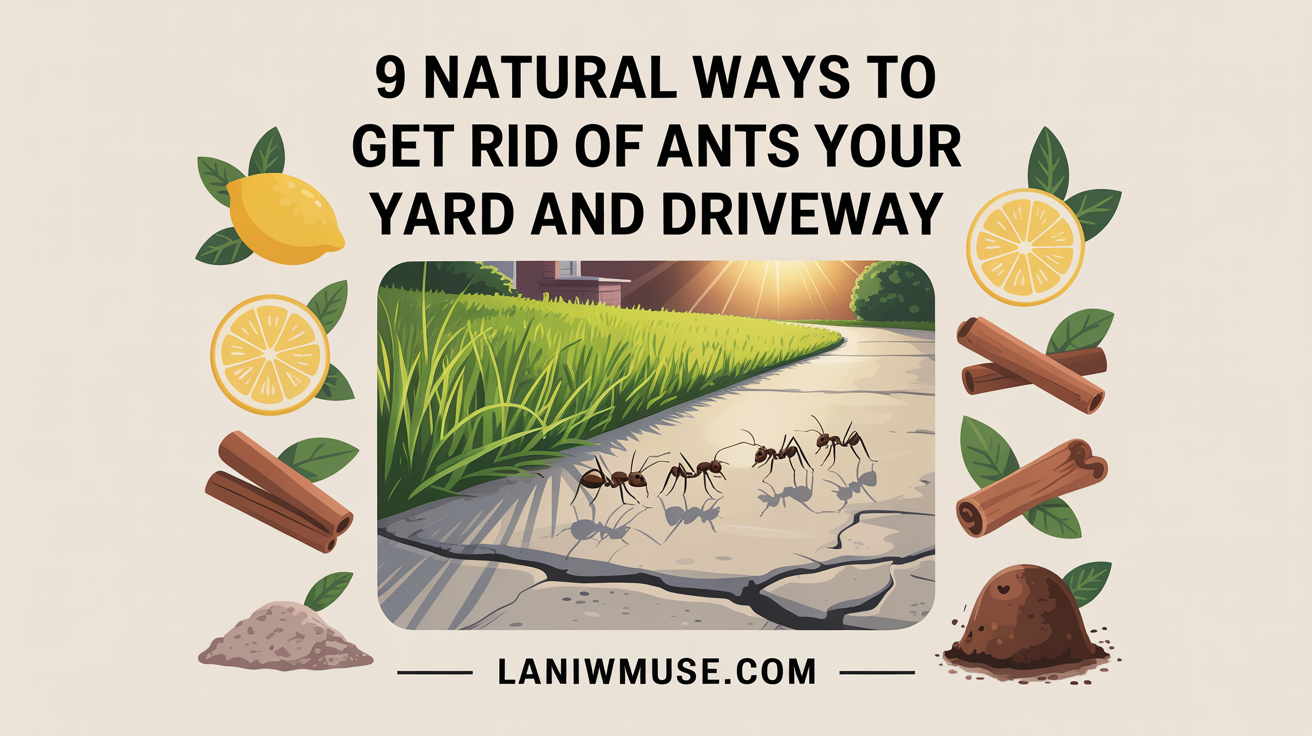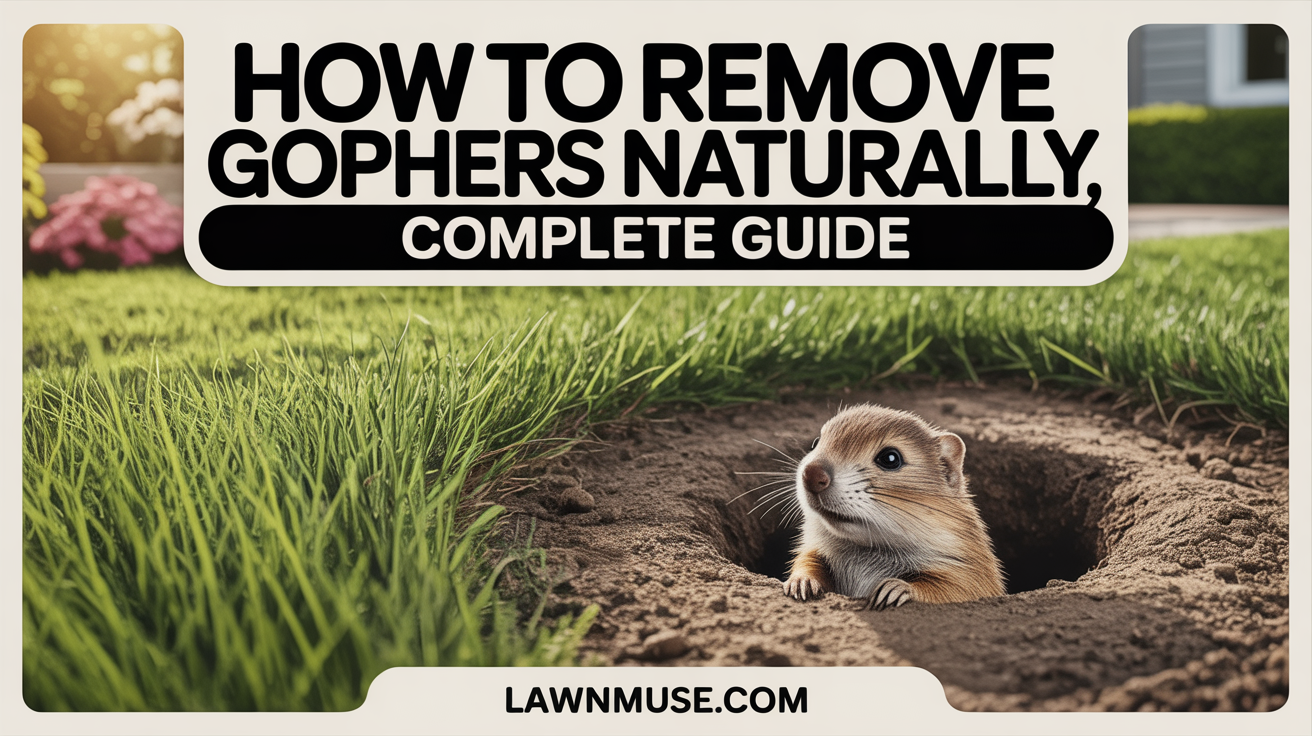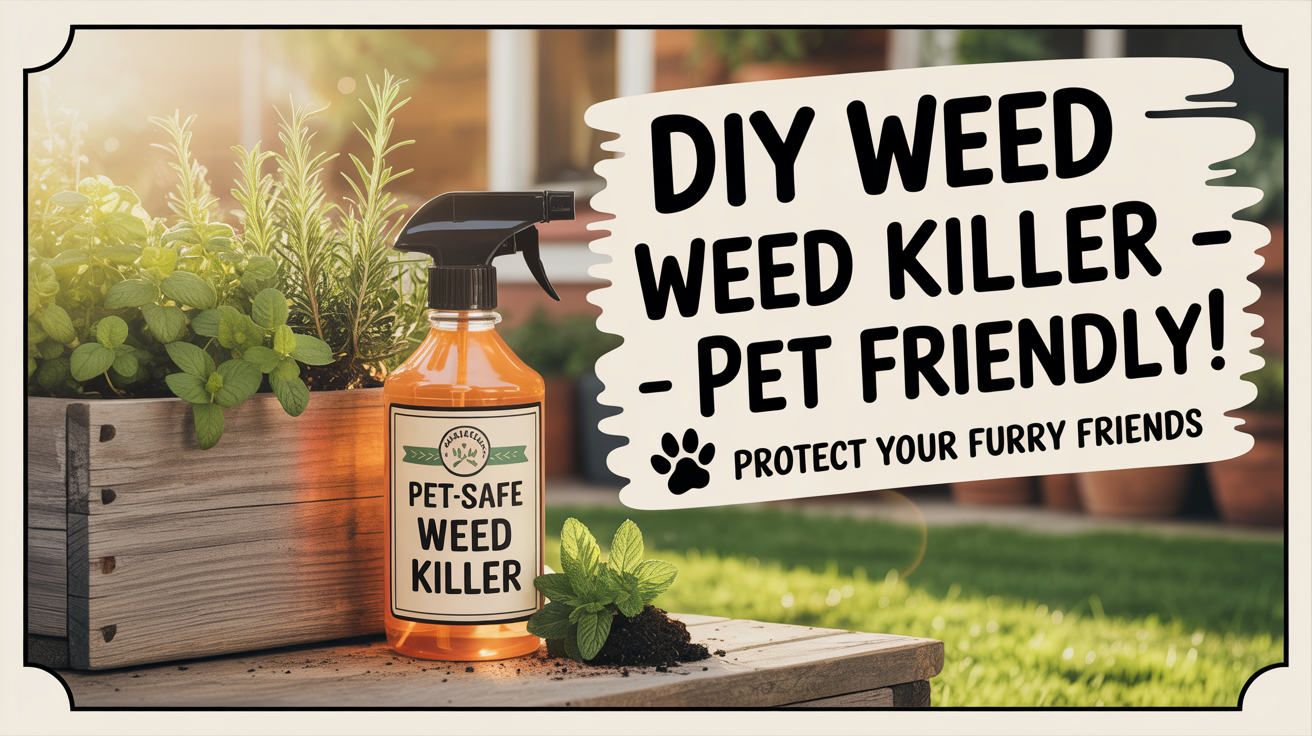Dealing with ants in your yard or driveway can be frustrating. These tiny invaders can disrupt outdoor gatherings, damage your plants, and even find their way into your home. While reaching for a chemical spray might seem like the quickest solution, it can harm beneficial insects and disrupt your lawn’s natural balance.
Fortunately, there are natural, eco-friendly methods that are just as effective at keeping ants at bay without the harsh chemicals. In this guide, we’ll cover seven tried-and-true ways to eliminate ants from your outdoor spaces, so you can reclaim your yard and enjoy the great outdoors without worrying about these persistent pests.
1.Sprinkle Baking Soda or Baby Powder
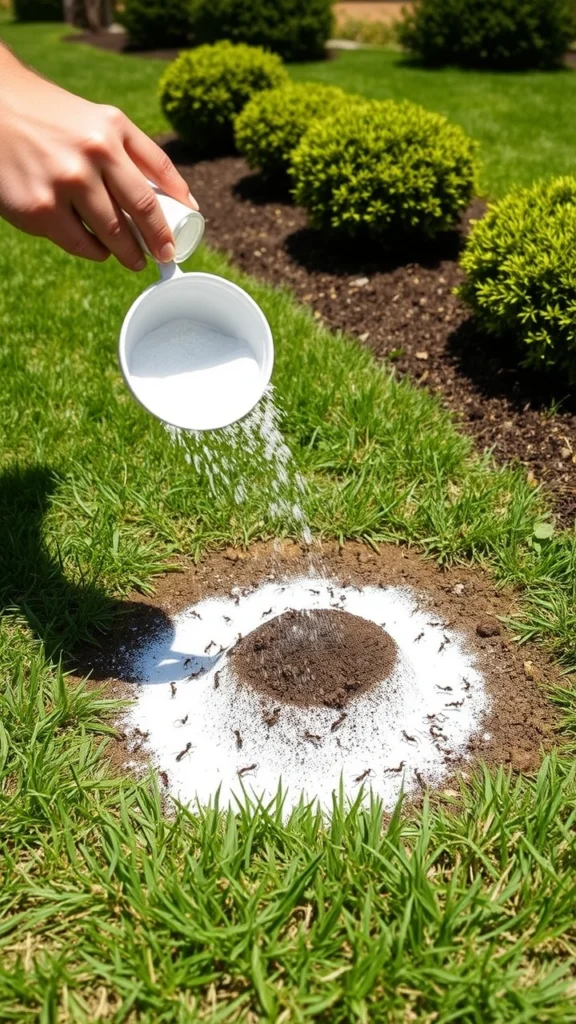
Baking soda and baby powder are simple yet highly effective remedies for controlling ants in your yard and driveway. These household staples work differently but can be powerful when used correctly.
Why It Works
Baking soda disrupts an ant’s internal chemistry. When ants consume it, the baking soda reacts with their acidic digestive system, creating a gas that they cannot expel, ultimately leading to their death. Baby powder, on the other hand, is a natural repellent. The fine powder clings to the ants’ bodies, clogging their breathing pores and disrupting their scent trails, which are crucial for communication and navigation.
How to Use Baking Soda
- Locate Ant Trails and Nests: Identify where the ants are entering your yard or driveway.
- Create a Bait Mix: For more effective results, mix equal parts of baking soda and powdered sugar. The sugar attracts the ants, while the baking soda acts as the lethal agent.
- Sprinkle the Mix: Spread the mixture around ant mounds, along pathways, and near entry points. Be sure to refresh the mixture every few days, especially after rain, for maximum impact.
- Monitor and Reapply: Keep an eye on the treated areas and reapply as needed until the ant population decreases.
How to Use Baby Powder
- Direct Application: Sprinkle baby powder directly onto visible ant trails, near nests, or along cracks in driveways where ants commonly travel.
- Barrier Method: Create a protective line around plants, patio edges, or doorways to prevent ants from crossing.
Additional Tips:
- Use unscented baby powder to avoid attracting other insects.
- Always apply when the ground is dry to prevent the powder from clumping.
Both baking soda and baby powder offer a low-cost, chemical-free way to keep your yard ant-free while minimizing the risk to other beneficial insects and pets
2.Diatomaceous Earth (DE)
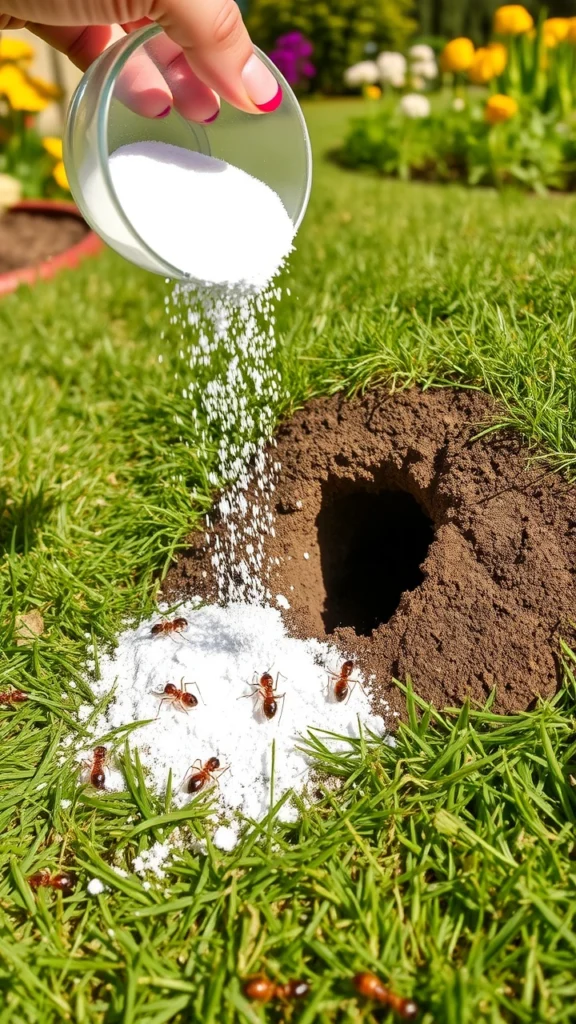
Diatomaceous earth (DE) is one of the most effective natural ant repellents available. It’s a fine, powdery substance made from the fossilized remains of microscopic algae known as diatoms. While harmless to humans and pets, it’s deadly to ants and other exoskeleton-bearing insects.
Why It Works
DE works by physically damaging the exoskeletons of ants as they walk across it. The sharp, microscopic edges cut through the ants’ protective outer layer, causing them to dehydrate and die. Unlike chemical insecticides, DE does not lose its effectiveness over time as long as it remains dry, making it a highly reliable and long-lasting solution for outdoor ant control.
How to Use Diatomaceous Earth
- Choose the Right Type: Always use food-grade DE, as it’s safe for use around pets, children, and plants. Avoid pool-grade DE, which contains added chemicals and is intended for filtration systems, not pest control.
- Apply in Dry Conditions: DE loses its effectiveness when wet, so apply it during dry weather. Reapply after rain or heavy dew for the best results.
- Target Problem Areas: Sprinkle DE around ant nests, along walkways, around the foundation of your house, and in cracks where ants might be entering.
- Create Barriers: Use DE to create protective barriers around garden beds, patio edges, or driveways where ants frequently travel.
- Monitor and Reapply: Regularly check the treated areas and refresh the DE as needed to maintain its effectiveness.
Additional Tips:
- Wear a mask when applying DE to avoid inhaling the fine powder.
- Store DE in a dry, sealed container to maintain its potency.
Diatomaceous earth is an excellent choice for those seeking a natural, chemical-free way to eliminate ants while maintaining a healthy yard ecosystem.
3.Borax/Boric Acid
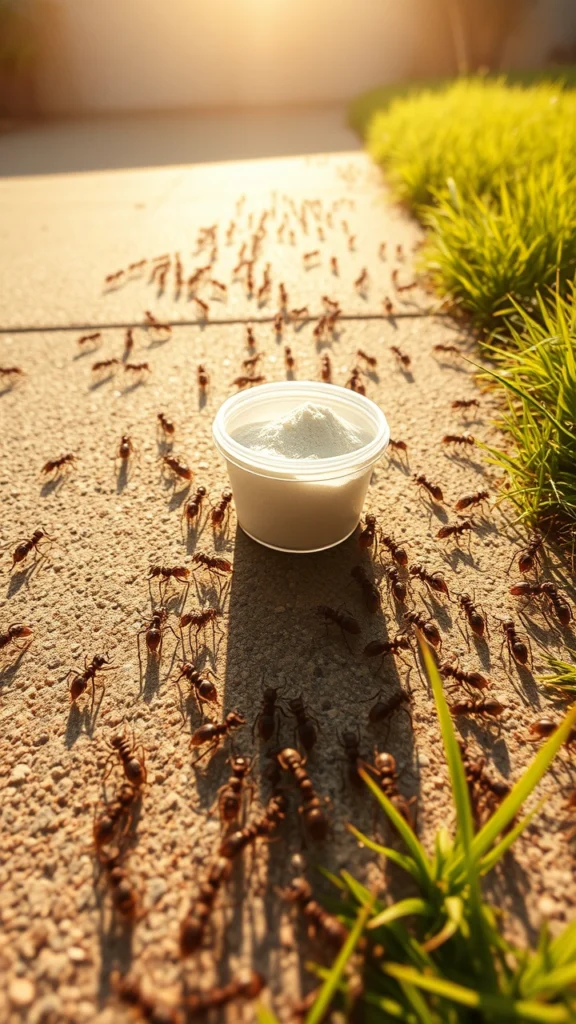
Borax (sodium borate) and boric acid are two of the most effective natural ant killers, known for their ability to eliminate entire colonies rather than just individual ants. Both substances are derived from the same mineral and work by disrupting the ants’ digestive systems.
Why It Works
Borax and boric acid are toxic to ants but have a delayed effect, allowing the worker ants to carry the poisoned bait back to the nest, where it can be consumed by the queen and other colony members. Once ingested, these substances disrupt the ants’ metabolism, ultimately leading to their death. This slow-acting nature makes them highly effective for long-term ant control.
How to Use Borax or Boric Acid
- Create a Sugar Bait: Mix one part borax or boric acid with three parts powdered sugar or honey. The sugar attracts the ants, while the borax acts as the killing agent.
- Place the Bait Strategically: Apply the bait near ant trails, nest entrances, and known pathways where ants are likely to forage. Use small, shallow containers or pieces of cardboard to hold the bait.
- Keep Away from Pets and Children: While borax and boric acid are natural, they can still be harmful if ingested in large quantities, so place the bait out of reach of pets and children.
- Monitor and Replenish: Check the bait regularly and refresh it as needed until the ant population is under control.
Additional Tips:
- Use liquid bait for faster results, as ants can consume it more quickly than solid bait.
- Keep the bait stations dry to prevent the sugar from clumping.
Borax and boric acid offer a potent, low-cost solution for tackling even the most stubborn ant infestations while minimizing your impact on the surrounding ecosystem.
4.Boiling Water

Boiling water is one of the simplest yet highly effective ways to eliminate ants directly at their source. This method is particularly useful for tackling large outdoor ant colonies that have built extensive underground nests.
Why It Works
The intense heat of boiling water kills ants on contact, including the queen, larvae, and worker ants. It also collapses the tunnels and chambers within the nest, disrupting the colony’s structure and making it harder for ants to recover and re-establish their base.
How to Use Boiling Water
- Locate the Nest: Identify the primary ant mounds or nests in your yard or driveway. Look for small, raised patches of soil with a central opening where ants enter and exit.
- Boil the Water: Bring a large pot of water to a rolling boil.
- Apply Directly: Carefully pour the boiling water directly into the nest opening. Use enough water to penetrate deep into the tunnels for maximum effectiveness.
- Repeat as Needed: You may need to repeat this process several times over a few days to ensure you completely eliminate the colony.
Safety Tips:
- Exercise caution to avoid burns when handling boiling water.
- Keep children and pets away from the treatment area until it cools down.
Boiling water is a quick, chemical-free method for controlling ants, but it’s best suited for isolated colonies and should be used with care to avoid damaging surrounding plants.
5.Garden Hose Water
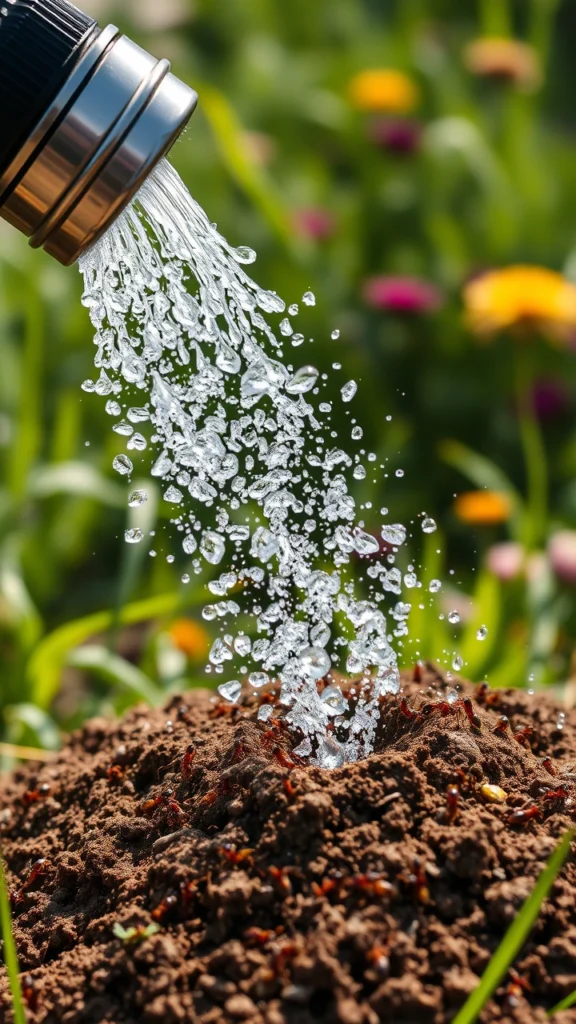
Using a garden hose to disrupt and dislodge ants is a practical and chemical-free way to control their presence in your yard. The force of the water can break up ant colonies, wash away their scent trails, and discourage them from rebuilding in the same area.
Why It Works
A powerful spray of water can destroy the delicate tunnels and chambers ants build underground. It also washes away the pheromone trails ants use to navigate, forcing them to relocate and reducing their chances of returning.
How to Use Garden Hose Water
- Identify Problem Areas: Locate visible ant mounds, trails, and nests in your yard.
- Use a High-Pressure Nozzle: Attach a high-pressure nozzle to your garden hose to increase the water’s impact.
- Direct the Water Flow: Drench the nest opening and surrounding soil to break up tunnels and displace the ants.
- Repeat as Needed: This method may require multiple applications over several days for lasting results.
Additional Tips:
- Use this method in combination with other natural remedies for more effective control.
- Be mindful of water conservation and avoid overwatering nearby plants.
6.Soapy Water

Soapy water is an effective, low-cost method for killing ants on contact and disrupting their trails, making it harder for them to find their way back to the nest.
Why It Works
Soap breaks down the ants’ protective exoskeleton and disrupts their cell membranes, causing them to dehydrate and die. It also eliminates the pheromone trails they use to navigate, preventing more ants from following the same path.
How to Use Soapy Water
- Mix the Solution: Combine one to two tablespoons of liquid dish soap with a quart of water in a spray bottle.
- Target Problem Areas: Spray the solution directly on visible ants, nests, and trails. Be sure to soak the entry points to nests for maximum effectiveness.
- Wipe Away Trails: Use the soapy solution to wipe down surfaces where ants have been active, such as patios, outdoor furniture, and pathways.
- Repeat as Needed: Reapply the solution every few days or after rain to keep ants at bay.
Additional Tips:
- Avoid spraying directly on plants, as some soaps can be harsh on foliage.
- Use a mild, biodegradable soap for a more eco-friendly approach.
7. Artificial Sweeteners
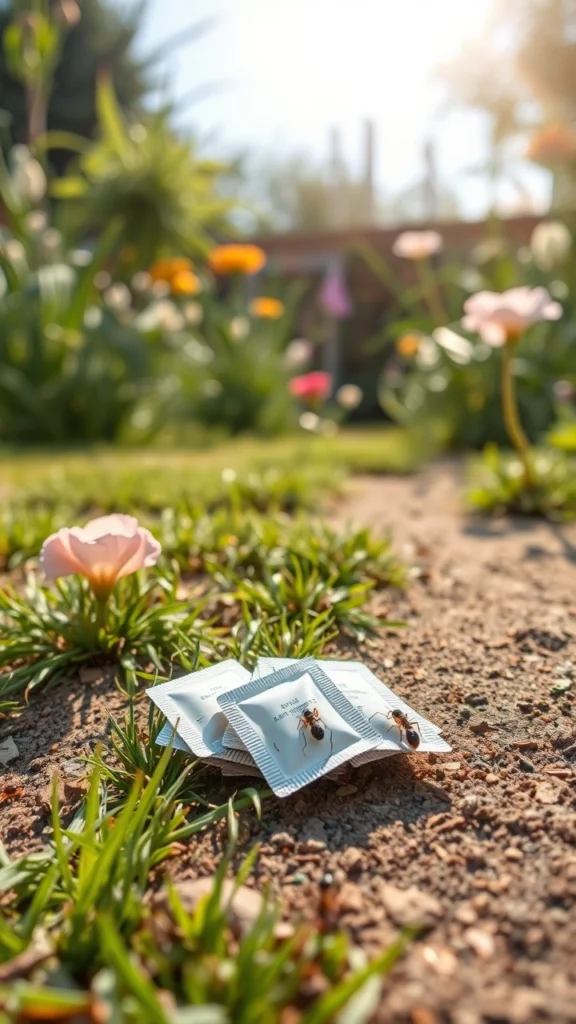
Artificial sweeteners, like aspartame, sucralose, and saccharin, are not just popular for sweetening beverages—they can also help in controlling ant populations in your yard and driveway. These sweeteners have gained attention as a viable natural remedy for eliminating ants due to their ability to interfere with their digestive systems.
Why It Works
Ants are highly attracted to sweet substances, and they rely on food sources rich in sugars for energy. Artificial sweeteners, despite having no calories, can mimic the effect of real sugar in the ants’ sense of taste. When ants consume artificial sweeteners, they are unable to digest them properly. This leads to dehydration, digestive problems, and eventually death for the ants. The sweeteners do not harm humans or pets, making them a safe and effective choice for ant control.
How to Use Artificial Sweeteners
- Create a Bait Mixture: To make an attractive bait for the ants, mix a small amount of artificial sweetener (such as aspartame or sucralose) with a bit of water to dissolve it, or combine it with powdered sugar. The sugar will attract the ants, while the artificial sweetener acts as the lethal agent.
- Place the Bait Strategically: Place the bait along ant trails, near their nests, or where ants are most active. Ants will carry the mixture back to their colony, where it can affect the queen and other workers.
- Monitor and Reapply: Check the bait stations regularly, and reapply the mixture if it gets washed away by rain or loses its potency over time. Continue applying until you notice a significant reduction in the ant population.
Additional Tips:
- Use artificial sweeteners that are specifically labeled safe for pets and children if you have them around.
- While artificial sweeteners are effective in killing ants, they should be used sparingly to avoid attracting other pests or causing harm to surrounding plants.
Artificial sweeteners offer an unconventional yet effective solution for managing ant infestations in your yard. By utilizing this method, you can maintain an eco-friendly approach to pest control while avoiding the use of harsh chemicals.
Here are two more natural ways to get rid of ants in your yard and driveway:
8. Vinegar Spray
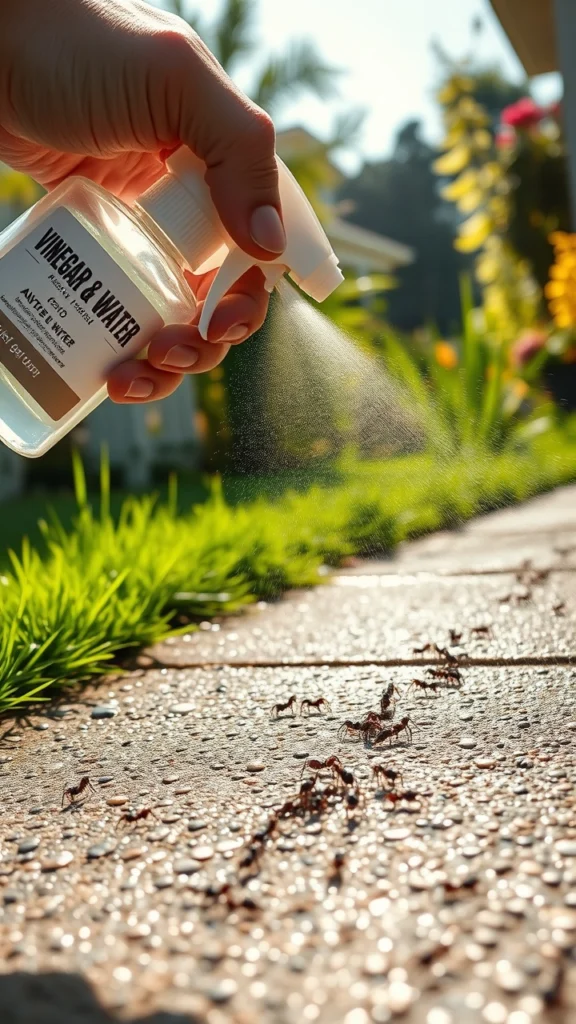
Vinegar is a powerful natural ant repellent that disrupts their scent trails and makes treated areas less appealing. Its strong odor confuses ants and masks the pheromones they rely on to communicate and navigate.
Why It Works
Vinegar, particularly white vinegar, has a strong, acidic scent that ants dislike. It interferes with their ability to detect food sources and communicate with each other, disrupting their colony structure over time.
How to Use Vinegar Spray
- Create the Solution: Mix equal parts white vinegar and water in a spray bottle. For a stronger effect, you can add a few drops of essential oils like peppermint or tea tree oil, which also repel ants.
- Spray Problem Areas: Spray the solution directly on ant trails, nests, cracks, and entry points around your yard and driveway.
- Repeat as Needed: Reapply every few days, especially after rain or cleaning, to maintain the barrier.
Additional Tips:
- Use caution around plants, as too much vinegar can alter the soil pH.
- Clean outdoor surfaces like patios and walkways with vinegar to remove ant trails.
9. Coffee Grounds
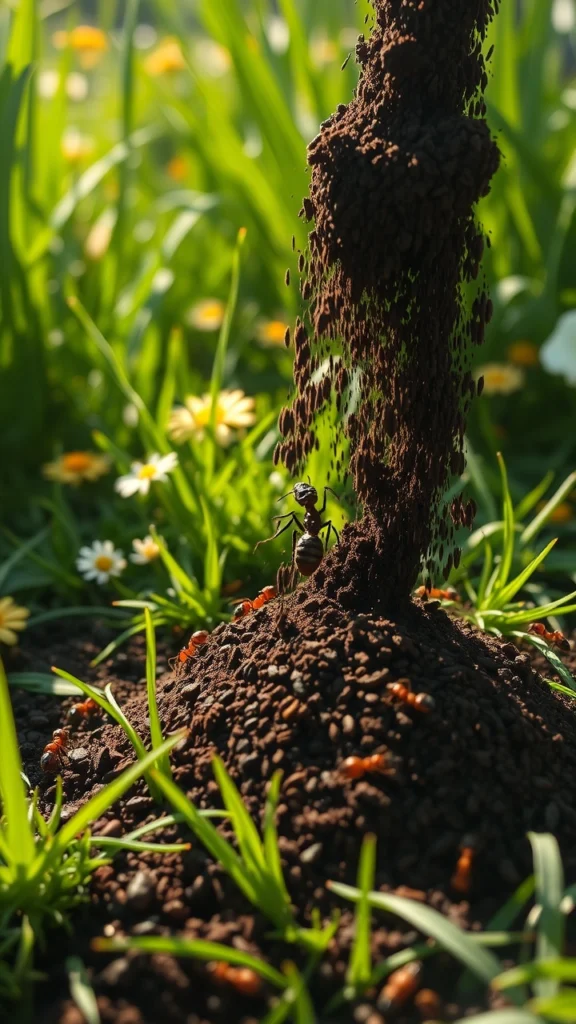
Used coffee grounds are an excellent, eco-friendly way to deter ants. The strong, bitter smell confuses their scent trails, and the coarse texture can irritate their bodies, discouraging them from returning
Why It Works
Ants have a strong sense of smell, and the potent, acidic scent of coffee grounds disrupts their ability to communicate and forage effectively. Additionally, the gritty texture of the grounds can act as a physical barrier, making it difficult for ants to navigate.
How to Use Coffee Grounds
- Collect the Grounds: Save used coffee grounds from your morning brew. Make sure they are completely dry before using them, as wet grounds can mold.
- Apply to Problem Areas: Spread the grounds around ant mounds, along walkways, near cracks, and at entry points.
- Refresh Regularly: Replace the coffee grounds every few days or after heavy rain for continued effectiveness.
Additional Tips:
- Coffee grounds can also benefit your garden by adding nutrients to the soil as they break down.
- Combine with other natural repellents like cinnamon or cayenne pepper for a more potent effect.
Final Word
Dealing with ants in your yard and driveway can be a nuisance, but with these seven natural methods, you can effectively control and eliminate these pests without resorting to harsh chemicals. Each of these eco-friendly solutions offers unique benefits, making them ideal for those who want to maintain a healthy, balanced outdoor space while keeping ants at bay.
- Sprinkle Baking Soda or Baby Powder: A simple yet powerful remedy, baking soda disrupts ants’ internal chemistry, while baby powder acts as a repellent by clogging their breathing pores. Both options are inexpensive, easy to apply, and safe for surrounding plants and pets.
- Diatomaceous Earth (DE): DE is a non-toxic, long-lasting solution that works by physically damaging the exoskeletons of ants, leading to dehydration and death. It’s a safe and reliable option that can be used around pets and children, ensuring a chemical-free approach to ant control.
- Borax/Boric Acid: By disrupting ants’ digestive systems, borax and boric acid act as potent ant killers. These substances, when mixed with sugar, can target entire ant colonies, making them effective for long-term control. However, care should be taken to keep them out of reach of pets and children.
- Boiling Water: A quick and straightforward method, boiling water kills ants on contact and disrupts the structure of their nests. While it requires caution to avoid burns, boiling water is an effective solution for dealing with large, outdoor colonies.
- Garden Hose Water: Using a garden hose to flood ant nests and disrupt their trails is a simple and chemical-free approach. The high-pressure water can break up the nests and wash away pheromone trails, forcing ants to relocate. This method may require several applications but offers an easy solution to keep ants in check.
- Soapy Water: A mixture of soap and water can smother ants and suffocate them by blocking their breathing pores. It’s easy to prepare and apply, making it a great go-to option for localized infestations.
- Artificial Sweeteners: Although unconventional, artificial sweeteners can trick ants into consuming something they can’t digest, leading to their eventual demise. This method is safe for pets and children, but care should be taken not to overuse it, as it may attract other pests.
Incorporating these natural solutions into your routine can help you create an ant-free yard and driveway while protecting the environment. Whether you prefer a hands-on approach with boiling water or a more subtle solution with baking soda, there’s a method here for every preference. Remember, consistency is key, and monitoring your efforts will ensure you stay ahead of the infestation. With these eco-friendly strategies, you can enjoy a peaceful, ant-free outdoor space without harming beneficial insects or your lawn’s health.

